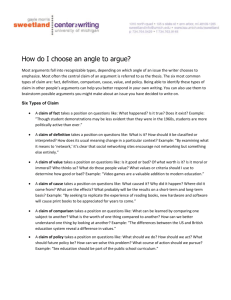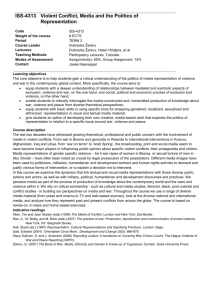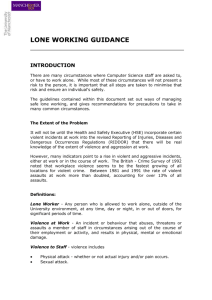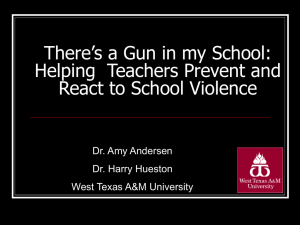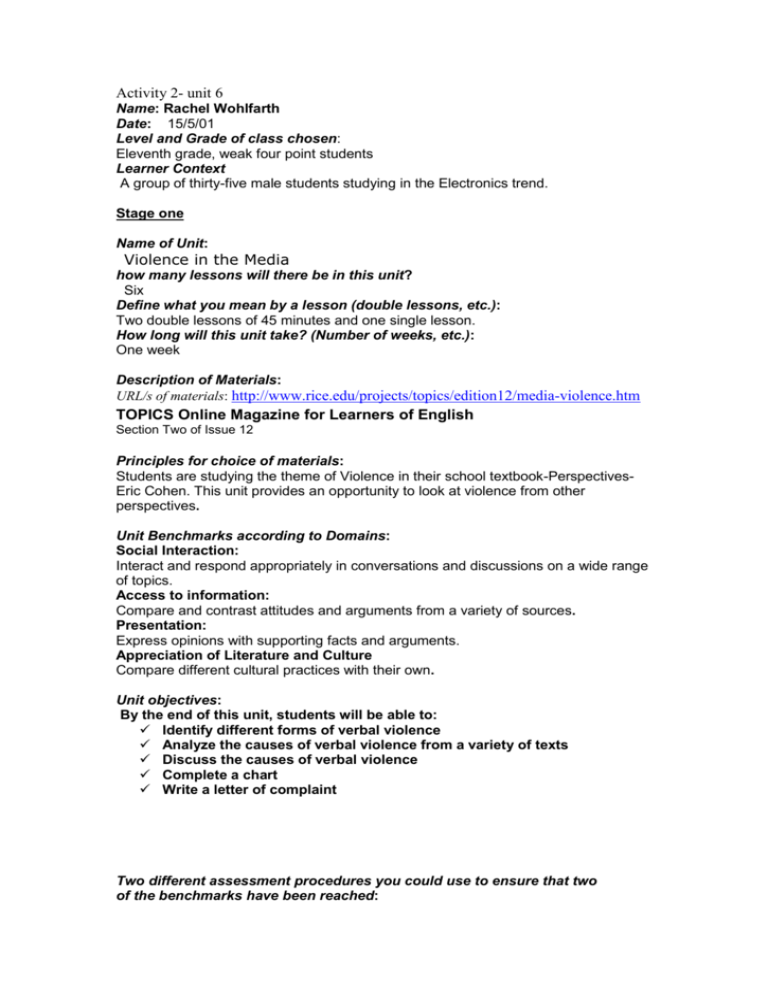
Activity 2- unit 6
Name: Rachel Wohlfarth
Date: 15/5/01
Level and Grade of class chosen:
Eleventh grade, weak four point students
Learner Context
A group of thirty-five male students studying in the Electronics trend.
Stage one
Name of Unit:
Violence in the Media
how many lessons will there be in this unit?
Six
Define what you mean by a lesson (double lessons, etc.):
Two double lessons of 45 minutes and one single lesson.
How long will this unit take? (Number of weeks, etc.):
One week
Description of Materials:
URL/s of materials: http://www.rice.edu/projects/topics/edition12/media-violence.htm
TOPICS Online Magazine for Learners of English
Section Two of Issue 12
Principles for choice of materials:
Students are studying the theme of Violence in their school textbook-PerspectivesEric Cohen. This unit provides an opportunity to look at violence from other
perspectives.
Unit Benchmarks according to Domains:
Social Interaction:
Interact and respond appropriately in conversations and discussions on a wide range
of topics.
Access to information:
Compare and contrast attitudes and arguments from a variety of sources.
Presentation:
Express opinions with supporting facts and arguments.
Appreciation of Literature and Culture
Compare different cultural practices with their own.
Unit objectives:
By the end of this unit, students will be able to:
Identify different forms of verbal violence
Analyze the causes of verbal violence from a variety of texts
Discuss the causes of verbal violence
Complete a chart
Write a letter of complaint
Two different assessment procedures you could use to ensure that two
of the benchmarks have been reached:
1. Holistic
After completing the Unit on Violence in the Media
I know vocabulary on the media
I know vocabulary on violence
I can talk about media violence
I know of at least three opinions on this subject
I know how to write a letter of complaint
I know words of comparison
Yes
2. Rubric
Activity
20
points
15
points
10
points
Chart
Students have
completed
chart in depth
.Show in
depth reading
and have
analyzed
texts
Students have
completed
most of chart,
but have not
presented
reasons or
language for
cheating
Students have
hardly
completed the
chart. Show
lack of
reading and
understanding
texts.
Metacognition
Students
discuss each
of the
questions in
depth and
have written
a list of five
tips or more
on how to
fill out a
chart
Students
present role
play do not
hesitate,
speak
fluently and
accurately.
Show
different
opinions on
cheating and
why he did or
did not cheat.
Student
collects five
Students
discuss each
of the
questions and
have written
one or two
tips on how
to fill out a
chart
Students skim
over each of
the questions
but have
written no
tips on how
to fill out a
chart
Students
present role
play. Hesitate
to speak and
make a few
mistakes.
Show
different
opinions on
cheating and
why he did or
did not cheat.
Students
hardly speak
in role play.
Have many
mistakes.
Show few
opinions on
cheating.
Role Play
Survey
Students Students
writes a list writes a list of
No
opinions on
cheating ,
reasons and
methods
Writing
of questions
for survey,
but collects
only one or
two opinions,
reasons and
methods
Writes an
Writes report,
organized
based on
report(120
collected
words), based data. Few
on collected
facts and
data. Presents examples.
facts and
(Less than
examples
120 words)
questions for
survey, but
does not carry
out survey
Writes several
points on
cheating .
Presents no
facts nor
examples
Assessment Principles from the curriculum relevant to these above
assessment procedures:
The pupils know the criteria for assessment before assessment
The content and types of tasks to be assessed need to be made clear and
explicit to the pupils
Pupils are assessed at various stages of the learning process.
All areas of language ability, including higher-order thinking skills, are
assessed
Stage two.
Name of Lesson:
Verbal Violence.
Lesson Benchmark/s and domain/s:
Social Interaction:
Engage in a conversation confidently, adapting language to suit context, audience
and purpose
Access to information:
Understand the main ideas and significant details of a text.
Presentation:
Express opinions with supporting facts and arguments.
Appreciation of Literature and Culture
Compare different cultural practices with their own
Lesson Objectives:
By the end of this unit students will have:
Completed a chart.
Read about different kinds of verbal violence.
Discovered different sources of verbal violence.
Scanned the texts for information.
Discussed why TV programs include foul language
Written a letter of complaint
.
Lesson Plan with short description of activities:
The lesson begins with the teacher introducing the theme of the lesson
Brainstorm:
What is verbal violence?
Can you give me an example of verbal violence?
How does it differ from physical violence?
How can bad language effect young people
Should violent lyrics in songs and crude, rude language on TV
programs and movies be regulated
Student jots down ideas.
Read the articles: Media Watch Your Language
Bad Language Can Affect Young People
Effects of Violent Lyrics in Music
Violent Lyrics are a Way to Express Anger
Objectionable words in Movies and on TV
Complete the following chart
Author
Na-hyun
Kim
Origin
Cause
The use of
crude, foul
language on
Effect
Example
TV programs
and in the
movies has
been
increasing.
Vietnam
young people
use bad
language and
behave
aggressively
--------------Children
copying bad
language
4. Once you have completed the chart discuss the following questions:
How did you work together?
Did both of you read the texts together or separately?
Did you discuss the text with your partner?
What strategies did you use in order to read the text?
What strategies did you use in order complete this chart?
What have you learnt from reading the articles?
What have you learnt from completing the chart?
If you were stuck at any stage, what did you do?
Let us now continue with a Role –play
Role Play
Two TV producers discuss whether to allow the use of foul language in
a teen program the reasons for and against it.
Present your Role-play to the class
Writing Activity (Homework)
You are an anxious parent. You have just seen your young son watch an
extremely foul-mouthed show at children’s prime time. Write a letter of complaint
to the Television Company. You may include the following points if you wish.
The reason why you are complaining
The program, name ,time and channel
A description of the content of the program,
How this program influences your son
Any suggestions/requests you wish to make
Once you have finished you’re writing check the following:
Have I presented the information in an organized manner?
Have I used the correct outline? (formal letter)
Is the material relevant?
Are there paragraphs?
Do I have a topic sentence for each paragraph?
Have I checked grammar, spelling and punctuation?
Have I used the correct register
:
Principles of language learning and language teaching relevant to these
activities:
Opportunities to learn by doing
Interact, share, exchange and work together in the language
classroom
Feel challenged within the possible range of their performance
Build on their prior language and world knowledge
Are conscious of how they learn and how they can constantly develop
better ways of learning the language
Choose one activity for an assessment procedure.
The Chart.
Objectives of that activity:
By the end of this activity students will have:
Completed a chart.
Read about different kinds of verbal violence.
Discovered different sources of verbal violence.
Scanned the texts for information.
Discussed the possible answers to the chart.
Detailed description of activity:
After the introduction to the theme and discussion students divide into pairs. Each
group enters the site. Students must first read each of the texts. Once they have
completed their initial reading the students skim the text to find the correct
information. Students should note that in each case, one item of information is given.
Once they have completed this task, students complete the metacognition activities
to see how they have worked and what they have learned from completing this task.
Accompanying worksheets/materials: (as presented above)
TOPICS Online Magazine | Issue 12 | Violence in the Media
Media, Watch Your Language
Should violent lyrics in songs and crude, rude language on
TV programs and movies be regulated?
Na-Hyun Kim from Korea
Uyen Thanh from Vietnam
Raju Man Shrestha from
Nepal
Fatou Samba from Senegal
Yen Ngo from Vietnam
Bad Language Can Affect Young People
Na-Hyun Kim from Korea
"In my opinion, the TV and movie entertainment industry should control the
amount of crude or foul language in their programs."
Recently the use of crude, foul language on TV programs and in the movies has
been increasing. Young children or teenagers can be affected by exposure to this bad
language. In the case of very young people, they sometimes hear the words and use
them even though they don't really know what they mean. For example, one day a
four-year old boy I know well used bad language when he spoke to me. I was
surprised, and I asked him if he knew the meanings of what he was saying. Of course,
he didn't. Then when he uses these words, other children hear them and also speak out
the same words.
After that, I decided to carefully choose programs for my nephew. I think I have to do
it because I don't want him to be negatively affected by TV. Parents and others find
this language objectionable, too. In my opinion, the TV and movie entertainment
industry should control the amount of crude or foul language in their programs. I
think it's the best way to protect young people from being exposed to such language.
Violent Lyrics Can Affect Young People's Spirits
Uyen Thanh from Vietnam
"Music in the clubs or discotheques such as rap and rock music often
contain loud lyrics, and some songs even have violent lyrics which can have
a bad influence on young people."
Nowadays, modern music is spreading all over the world and having a strong effect
on youth. Music in the clubs or discotheques such as rap and rock music often contain
loud lyrics, and some songs even have violent lyrics which can have a bad influence
on young people. This kind of music affects their spirit negatively. With bad words
and depressing ideas such as doomsday or the end of the world, sacrifice in love, and
loss of religious belief; these songs make young people frightened and unable to
control themselves. For example, you might remember that some young people killed
themselves some years ago after listening to a song by Michael Jackson about
doomsday. This song has an extremely unfortunate effect on some young people.
They couldn't control themselves and wanted to kill themselves and others.
Effects of Violent Lyrics in Music
Raju Man Shrestha from Nepal
"Young people who listen to this kind of music hear bad words (profanity),
and this affects their own language and habits."
Music entertains, relaxes, or excites people. Classical music is relaxing and is good
for your health. This type of music gives a mental boost and has a good effect on
people, but nowadays people listen to so much music which has violent lyrics. They
listen to pop, rap, and heavy metallic music, and this kind of music and many of these
songs have violent lyrics. Young people who listen to this kind of music hear bad
words (profanity), and this affects their own language and habits. Many young people
who listen to these songs think that it is good to use the bad words and want to show
off to to other people by using them. This kind of violent music can make some young
people behave aggressively in society. Recently, for example in some schools, some
young people killed their classmates. Police later found out they used to listen to
music with violent lyrics.
Violent Lyrics are a Way to Express Anger
Fatou Samba from Senegal
"...music has become a way for some singers to show their anger by using
violent lyrics."
Nowadays the world is swamped with people who say they have the right to
freedom of expression. Everybody can express his or her anger however he or she
wants. For example, music has become a way for some singers to show their anger by
using violent lyrics. Young singers are taking this violent attitude so far that it is the
principal subject in their songs.
Related to our daily life, these violent lyrics might be a way for people to become
more aware of violence in life. On the other hand, these violent lyrics in music can be
negative when young people listen to them and practice them without having any
awareness of what they mean.
Objectionable words in Movies and on TV
Yen Ngo from Vietnam
"Imagine your children hearing those words; they could copy them and get
used to saying them."
Some movies on TV have objectionable words that have bad effects on children.
Some performers say bad words. Imagine your children hearing those words; they
could copy and get used to saying them. They will become impolite people, and
maybe they won't be able to get along with their classmates or other people.
At the same time, their minds are always thinking about the meaning of those bad
words, so they'll have a bad attitude. People who have a bad attitude sometimes do
bad things or act violently, and a society that has a lot of violent people can't be a
stable society.
More on media violence
The Issue of Televised Violence
What about Violence in Movies?
Looking at Video Game Violence
It's Time to Save Our Children
Everyone is Responsible
An Endless Debate: Freedom of Expression
Is a Rating System Censorship?
Return to
Violence in the Media
~ This Issue ~ Home Page
TOPICS Online Magazine. © Copyright 1997-1999. All Rights Reserved.
Contact Us: topics_mag@yahoo.com
Accompanying assessment procedure:
Activity
20
points
15
points
10
points
Chart
Students have
completed
chart in depth
.Show in
depth reading
and have
analyzed
texts
Students have
completed
most of chart,
but have not
presented
reasons or
language for
cheating
Students have
hardly
completed the
chart. Show
lack of
reading and
understanding
texts.
Reflection:
How has creating this entire unit influenced my understanding of the
curriculum?
I have found myself continually reviewing what I have done. Creating the whole unit has
allowed me to focus on the various elements of the new curriculum. Some of the process
I found quite frustrating (I was not sure what was expected of me) where at other times
I found this activity quite challenging. I now understand that in order to understand the
new curriculum I must approach my planning in a different manner than previously.
I hope that my teaching has taken on a new sphere and outlook.
Copyright: Jean Vermel, 2001



